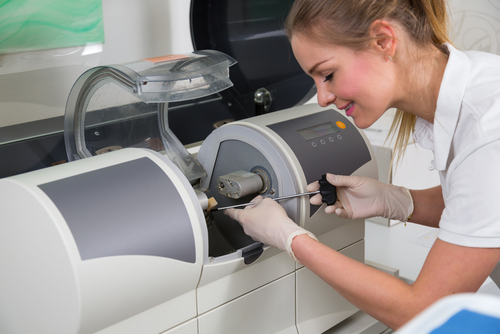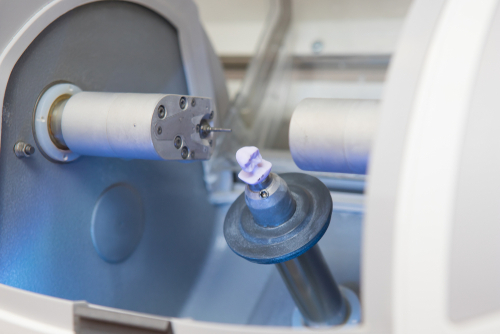What are dental crowns?
Dental crowns are like a helmet around a tooth. It covers a tooth 360 degrees all around, and it's a restoration that helps restore the tooth structure back. It's used if someone had a fractured tooth, a big filling that broke off, a big cavity that had to be taken out, or had a root canal treatment. It helps to restore the function of your tooth so you can continue to use it.
What are the alternatives to dental crowns?
Some of the alternatives could involve doing a very big filling on a tooth.
What types of dental crowns are there?
There are many different kinds of dental crowns available. One common type is a tooth color material matching crowns, which we also call ceramic crowns. They are made of material that is tooth colored. Another type is a crown with two different kinds of materials, metal underneath and a layering of porcelain on top. There is also a pure gold crown, which is a combination of different metals, but we call it a dental gold crown.
Is a dental crown necessary after a root canal?
A dental crown is necessary most of the time after getting a root canal treatment. This is because after getting a root canal treatment, the nerve is taken out, so there is pretty much no supply, nerve supply to your tooth, so the tooth becomes brittle over time. The crown helps you maintain the tooth for a much longer time.
What is involved in the dental crown procedure?
The dental crown procedure could be a two-step process. First, your dentist will shape off your tooth so you're able to receive the crown on top. We take a little replica of the tooth and get you a temporary crown that you will be wearing while the lab is fabricating your final crown.
During the procedure, you will be administered anesthesia before we begin. The process involves taking a matrix, selecting the appropriate color, and shaping the tooth. Subsequently, we perform a scan—either a 3D digital scan or a final impression of the tooth. Following this, we create a temporary crown, place it on your tooth, and ensure a proper fit. Throughout this stage, we check your bite and ensure you can floss comfortably with the temporary crown.
Meanwhile, the lab works on fabricating your permanent crown. Once ready, you return for the next visit. At this point, we remove the temporary crown, clean the tooth, and place the permanent crown. We conduct thorough checks, including an x-ray, to confirm a precise fit. Our checklist ensures that the crown fits well, allows for easy flossing, and enables comfortable biting. We use permanent cement to secure the crown in place. It's important to note that the dental crown placement process is designed to be painless, as we ensure you are fully anesthetized. We utilize advanced tools to keep you completely numb, ensuring a comfortable experience throughout the procedure.
Does the dental crown placement hurt?
The dental crown placement does not hurt, and it should not hurt, because you will be fully anesthetized. We have all the tools necessary to make sure you are fully numb.
Are there any consequences for getting a tooth crown?
There are no bad consequences of getting a tooth crown done. The reason you're getting a crown done is so that you can enhance the life of your tooth. Sometimes patients may have some sensitivity after because the tooth is reshaped, but overall there are no long term bad consequences.
Is it worth putting children's teeth in crowns?
Yes, if they are needed. The reasons for needing a crown could be because of a break or a large cavity. If it's needed and it's going to help maintain the tooth and restore it to function well and stay in the mouth longer, then it is good to do it.
Do crowns look like normal teeth?
Yes, the crowns do look like normal teeth. With the technology we have available, we are able to match the shape and the color of the crown to the neighboring teeth.
Can you get cavities on crowned teeth?
Cavities can happen on crowned teeth. They could happen underneath the crown or most of the time along the gum line.
How long can you expect a dental crown to last?
Dental crowns can last 20, 30, 40 years or even a lifetime. This depends on how well they are taken care of and if regular dental visits are maintained.
Does insurance cover dental crowns?
It really depends on what kind of dental insurance you have. If your policy has that coverage, then yes, they can be covered.
How can I schedule an appointment to get a crown?
You can call our office and you will have to see either myself or my associate doctor. We will take an x-ray, check it out, explain the procedure and the outcome, and then you can get an appointment scheduled for it. The number to call is (603) 634-9445.
Porcelain Crowns
Restore and Protect Your Damaged Tooth
Porcelain crowns restore and protect damaged teeth while also beautifying them, making this a treatment that fits in both the restorative dentistry and cosmetic dentistry categories. At Smiles by the Sea, we create long-lasting, customized dental crowns designed to protect teeth and help them look natural, so they blend in with the rest of your smile.
Problems Fixed By Porcelain Crowns
 A dental crown – sometimes called a cap – is designed to fit over a damaged or unsightly tooth to make it stronger, function properly, and look better. Crowns are usually made of porcelain because the material is so durable and can be designed to look just like the rest of your teeth in color and shape.
A dental crown – sometimes called a cap – is designed to fit over a damaged or unsightly tooth to make it stronger, function properly, and look better. Crowns are usually made of porcelain because the material is so durable and can be designed to look just like the rest of your teeth in color and shape.
There are many oral health circumstances that call for a crown, including:
- Tooth decay: If the size of a cavity is so large that a large amount of tooth structure must be drilled away to remove the decay, there will not be enough enamel to support a tooth-colored filling. A crown protects the treated area and the rest of the tooth.
- Infected tooth: When a tooth must undergo root canal therapy because of a deep infection, there will be enamel removal and the structure of the tooth will be compromised – unless it is covered by a customized crown. This double solution also protects the tooth from extraction, and it is always your dentist’s goal to preserve natural teeth whenever possible.
- Fractured tooth: A cracked or chipped tooth is open to bacteria and food particles, which means infection and decay are likely if treatment is not pursued. Topping this problem tooth with a crown prevents further damage and restores the tooth to full strength and beauty.
- Weak tooth: When a tooth is weak because of age or worn enamel, it is susceptible to decay and damage. A crown makes a weak tooth tough and protects it from breaking down, while also safeguarding neighboring teeth.
- Misshapen tooth: An unsightly tooth that is misshapen or oddly sized can be built up to the right shape and form by a personalized porcelain crown.
- Stained tooth: Sometimes, a discolored tooth cannot be whitened, but you certainly wish it would blend into the rest of your teeth. By covering it with a crown you get a sturdy, natural-looking solution.
The Porcelain Crown Process
Getting a porcelain crown usually takes two visits to your Hampton dentist.
Here is what you can expect:
- Preparation: At your first dental visit, the tooth in question will be prepared for a crown. Decay will be removed, if necessary. An impression of your mouth will be taken so the crown can be designed just for you by a dental lab.
- Patience: Once the instructions for your crown have been sent to the lab, it usually takes about two weeks for the restoration to be ready. Depending on the condition of the tooth in question, you may receive a temporary crown while you wait for the permanent one so your smile is not marred.
- Completion: Once the crown is ready, you will visit your dentist again, have the temporary crown removed, confirm the fit and look of the crown, and have it permanently bonded to your natural tooth and adjusted as needed.
Same Day Crowns
When you have a broken, damaged, or infected tooth that requires a porcelain crown, you want to rely on a dentist’s office that has the technology to create your restoration immediately. At Smiles by the Sea in Hampton, NH, our office is home to the advanced CEREC system, which allows us to craft same-day crowns and restore your smile completely in the same visit.
What Is the CEREC System?
The CEREC system is a computer assisted design (CAD) and computer-assisted milling (CAM) system that produces sophisticated, customized dental restorations while you wait. This on-site technology is an investment that your dental office has made so it’s possible for patients to have whole smiles again quickly.
Benefits of a CEREC Same-Day Crown

The relief of knowing that your Hampton dental office provides same-day crowns is the first benefit of CEREC restorations. Other perks include:
- Immediate repair: Off-site dental labs can take days and sometimes weeks to create a restoration. CEREC gives you your smile back in one day.
- Perfect fit: When specifications are sent to a dental lab to create a crown, the restorations usually come back accurately. There is no substitute, though, for the kind of accuracy your dentist delivers in both the fit and appearance of on-site customized crowns.
- Convenient: When you have a broken tooth or damaged crown, it’s a big deal. You want the problem fixed as soon as possible, especially so the issue doesn’t interfere with your professional or social life. CEREC eliminates the need for multiple dental visits, saving you time and stress.
- Natural-looking: You can be guaranteed a dental restoration that looks natural and blends in with the rest of your teeth in size, shape, and color.
Dental Problems a Same-Day Crown Can Fix
 No one has ever experienced a dental problem at a convenient time, but it’s even worse when the repair you need to fix your tooth will take weeks to complete. CEREC same-day crowns eliminate this problem and can be used to repair multiple issues right away, including:
No one has ever experienced a dental problem at a convenient time, but it’s even worse when the repair you need to fix your tooth will take weeks to complete. CEREC same-day crowns eliminate this problem and can be used to repair multiple issues right away, including:
- Broken crown: Even the strongest crowns are at the mercy of age and become loose. They can also suffer damage because of biting down wrong on a food or from teeth grinding.
- Fractured tooth: When a tooth is broken, chipped, or damaged in some way, it is at risk of deteriorating quickly. Not tending to the problem creates space for food particles and bacteria to enter the tooth and cause decay or infection.
- Decayed tooth: Some tooth decay is so large that a tooth-colored filling will not work and a crown is needed as a more robust solution.
- Infected tooth: If you have a deep infection in your tooth, root canal therapy is necessary. Once the canals are meticulously cleaned out and sealed, the whole tooth needs to be covered with a crown for protection.
- Weak tooth: A deteriorating tooth or simply a weak tooth that is prone to breaking can be concealed and restored underneath a same-day crown.
- Unsightly tooth: If you have finally had it with an unsightly tooth that draws attention to itself because it is stained, oddly shaped, or flawed in some way, a customized crown conceals the problem immediately.
Are You A Good Candidate For Porcelain Crowns?
If you practice good daily oral hygiene by brushing and flossing, visit your dentist twice a year for a cleaning and checkup, and avoid using your teeth as tools to open something, your crown can last for decades. This versatile dental restoration is attractive, strong, and helps you have a more attractive and robust smile.
When you have a dental problem at a bad time, don’t despair. Contact Smiles by the Sea in Hampton, NH, to schedule an appointment or an emergency dental visit and find out if you are a good candidate for a CEREC same-day crown. This state-of-the-art solution has saved many people from upended plans and smile embarrassment.


